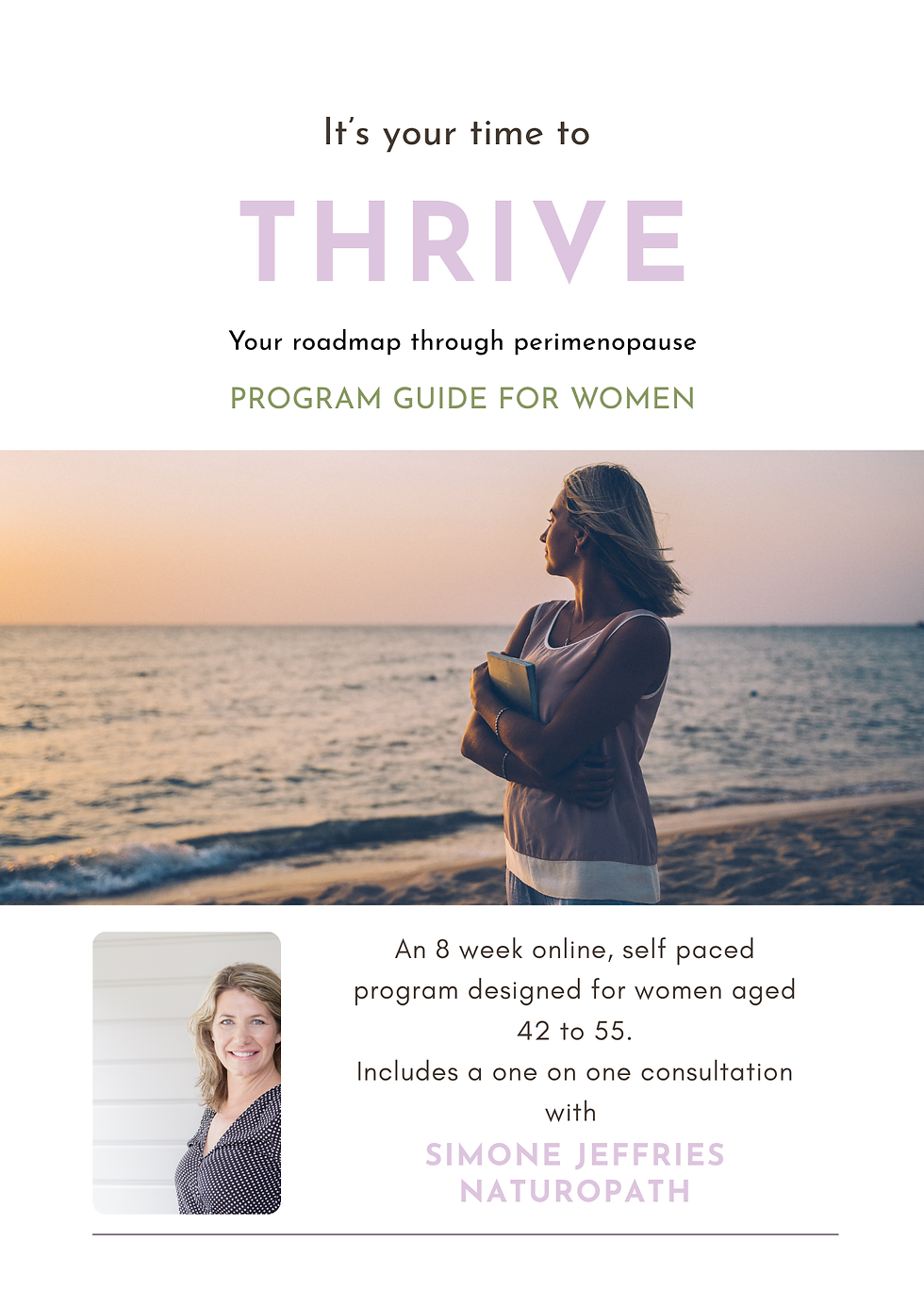Perimenopause - 5 things every woman should know
- Simone Jeffries

- Oct 18, 2017
- 3 min read
Updated: Jul 21, 2025
Perimenopause occurs in the 5 to 10 years leading up to menopause. For some women, perimenopause can be a more difficult time than menopause itself. Here are a few things I think every woman should know:

1. Perimenopause occurs in your 40s, not in old age:
It is very common for women to report that their doctor dismissed the suggestion that they might be in perimenopause, because they look too young. When the topic of perimenopause arises, we are frequently shown pictures of grey-haired older women, who appear to be about 70.
Many people in our western society associate menopause with old age. But this is a myth! On average, women start to experience perimenopause between the ages of 42 and 47. The average age for your period to stop (menopause) is 51.
2. Perimenopause can be more symptomatic than menopause:
Perimenopause is the time that the ovaries start to make less of our reproductive hormones. This period can be a roller-coaster of declining progesterone and estrogen, bringing many symptoms that we don't necessarily associate with menopause. The following are some of the common symptoms experienced in the early stage of perimenopause:
fatigue
insomnia with a busy mind
erratic menstrual cycle length
changes in period flow: including heavier, lighter, flooding and clotting
migraines
anxiety
worsening PMS and pain during menstruation
weight gain
recurrent Candida
The symptoms of perimenopause happen in phases:
early perimenopause (symptoms listed above)
late perimenopause (hot flushes, night sweats, depression)
post menopause (vaginal atrophy, loss of bone density, recurrent UTI's)
For more specific details of the hormonal changes experienced during the phases of menopause, please refer to my other blog: The Ultimate Guide to a Natural Perimenopause.
3. Stress makes perimenopause much worse:
Stress can exacerbate perimenopause symptoms. A stressed out, 40+ woman can feel like she is on a merry-go-round of anxiety, insomnia and spiralling health problems. It is common for a perimenopausal woman to describe having so many health problems that she doesn't know where to start. Read Vanessa's story and Sophie's story.

Hormones have complex interactions. Stress hormones cause direct disruption to our reproductive and thyroid hormones, worsening perimenopause. Women are often shocked to discover that the same lifestyle that they coped with in their 30's, is now causing them anxiety and menstrual symptoms.
If this sounds like it might apply to you, you might like to read my other blog: The secret to managing menopause - adrenal support.
4. Perimenopause can be managed with herbal medicine and dietary changes:
Many simple dietary interventions such as managing blood sugar fluctuations, eating more foods that contain magnesium, cutting back on histamine containing foods, drinking herbal teas, and reducing coffee and alcohol intake, can have a positive affect on your experience of perimenopause.
I have often seen women improve their symptoms by making simple tweaks to their diet. If you'd like to learn more about diet changes I recommend for perimenopause, you might like my blog: Your 6 step menopause diet plan.
A herbalist or naturopath can prescribe you a tailor-made herbal formula to deal with the specific symptoms that you are experiencing. Bespoke herbal medicines can greatly improve your sleep, energy and your experience of your menstrual cycle. Common problems such as flooding periods and low moods can respond well to herbal medicines prescribed by a naturopath who is skilled in this area.
5. Don't take chances with your health during perimenopause:
If you have any of the symptoms of perimenopause, its a good idea to get it checked out. There are other common conditions such as thyroid disease, low iron levels, endometriosis or fibroids that could be causing some of your symptoms. Pain or irregular bleeding is something that should always be investigated by your doctor.
I encourage you to start looking after your health when the first symptoms of perimenopause arise. Don't suffer in isolation and silence. Enquire about a consultation with a trusted naturopath, so that you can transition through perimenopause with ease and grace.
Simone :)

a PERSONALISED coaching program
for women who want to
grow and flourish
through the seasons of perimenopause



Hi! I'm Simone Jeffries. I am a naturopath, nutritionist, herbalist and certified wellness coach. I am also a foodie and an advocate for a whole food diet.
I love to support you with hormonal conditions, histamine intolerance and vaginal imbalances.
I welcome clients to consult with me at my clinic in Manly on Sydney's Northern Beaches, and online from anywhere in Australia.
The information in this blog is from my Bachelor of Health Science degree, experience from working with women in my clinic, and continuing research.
This blog is for information only and not intended to take the place of medical advice. Please seek assistance for any medical concerns.




Comments